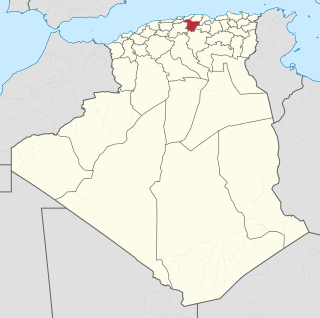Mokrani is a surname, and may refer to;
Mokrani derives from المقراني (El Mokrani), a town in Algeria.
El Mokrani is a town and commune in Bouïra Province, Algeria. According to the 1998 census it has a population of 4,856.

Algeria, officially the People's Democratic Republic of Algeria, is a country in the Maghreb region of North Africa. The capital and most populous city is Algiers, located in the far north of the country on the Mediterranean coast. With an area of 2,381,741 square kilometres (919,595 sq mi), Algeria is the tenth-largest country in the world, the world's largest Arab country, and the largest in Africa. Algeria is bordered to the northeast by Tunisia, to the east by Libya, to the west by Morocco, to the southwest by the Western Saharan territory, Mauritania, and Mali, to the southeast by Niger, and to the north by the Mediterranean Sea. The country is a semi-presidential republic consisting of 48 provinces and 1,541 communes (counties). It has the highest human development index of all non-island African countries.
- Cheikh Mokrani (1815–1871) - Leader of the Mokrani Revolt
- Mohamed Mokrani (born 1981) - Algerian handball player

Sheikh Mohamed El- Mokrani was one of the principal leaders of the popular uprising at the end of 19th century following the French conquest in Bordj Bou Arreridj, Algeria in 1830.

The Mokrani Revolt, known locally as the Unfaq urrumi,, which broke out on 16 March 1871, was the most important local uprising against French colonial power in Algeria since the conquest in 1830 : more than 250 tribes rose up, around a third of the population of the country. It was led by the Kabyles of the Biban mountains commanded by Cheikh Mokrani and his brother Boumezrag, as well as Cheikh El Haddad, head of the Rahmaniyya religious fraternity.
Mohamed Mokrani is an Algerian handball player for Dunkerque.











